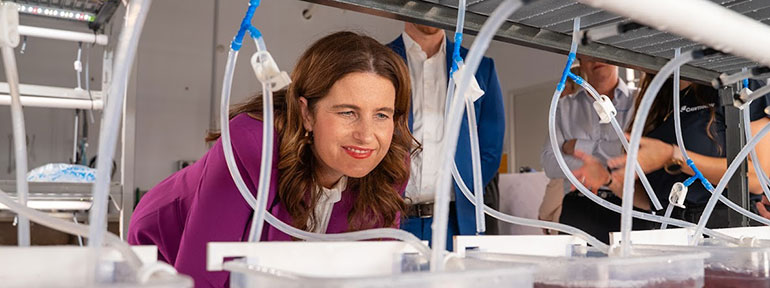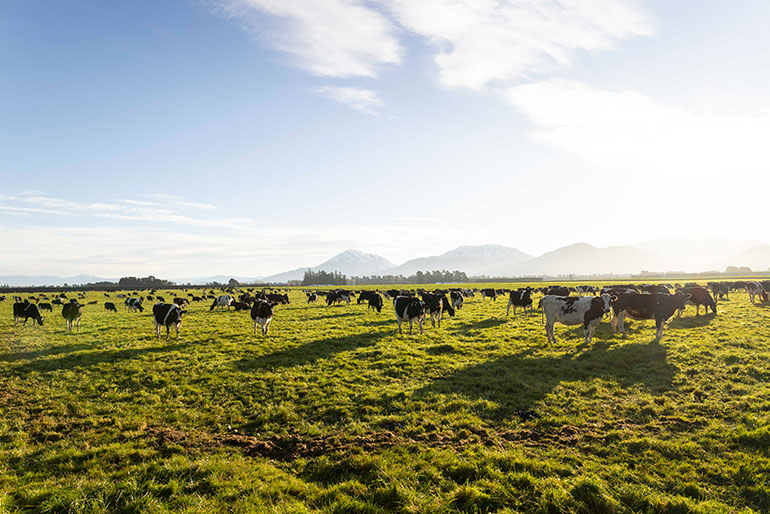Innovation, Technology and Science
Update 4 November 2025
Research and development (R&D) drives productivity and high-value jobs. By leveraging science, innovation, and technology, we add value to products and services, boost global competitiveness, and attract investment. Our goal is a system that empowers world-class scientists, universities, and research organisations to turn ideas into market-ready solutions. Our ambition is to drive a relentless focus on commercialisation and economic impact to meet the needs of a future-ready economy.
On this page I tēnei whārangi
Since the release of Going for Growth in February, the Government has maintained its focus on ensuring our science, innovation and technology system is set up to deliver growth, investment and commercialisation, delivering 21 actions that include:
- Creating the Prime Minister’s Science, Innovation and Technology Advisory Council to set priorities for the system, and ensure public investment is delivering value for New Zealand.
- Establishing 3 Public Research Organisations – the New Zealand Institute for Bioeconomy Science, the New Zealand Institute for Earth Science, and the New Zealand Institute for Public Health and Forensic Science – from existing CRIs to unlock innovation, drive economic growth and improve lives by translating ideas into commercial success.
- Committing $231 million to establishing a fourth Public Research Organisation, The New Zealand Institute for Advanced Technology "(NZIAT)", a cornerstone for growing a high-tech, high-value economy.
- Through the NZIAT investing $71 million in an advanced technology platform to grow New Zealand's
hi-tech exports based on cryogenics, superconductors, magnets and processed material. A further $70m will be invested in innovative AI research and applications. - Launching New Zealand’s first Artificial Intelligence (AI) Strategy, to boost productivity and capitalise on the $76 billion AI could add to our GDP by 2038.
These initiatives are designed to grow our talent in high-tech, high-value areas for New Zealand’s economy, and ensure our world-class researchers are set up to turn their great ideas into the next big opportunity.
Hearing from business on their priorities
Businesses are key engine-rooms of innovation in New Zealand, driving productivity and economic growth. We’ve heard clearly from the business community about what they need to thrive—and we’re acting. Our changes to the science, innovation and technology system are designed to unlock stronger partnerships between businesses and research organisations, attract and retain top talent, and support the responsible adoption of AI.

The Prime Minister’s Science, Innovation and Technology Advisory Council members. L-R: Professor Russell Frew, Malcolm Johns, Craig Piggot, Komal Mistry-Mehta, Rt Hon Christopher Luxon, Hon Dr Shane Reti, Dr John Roche, Sir Peter Gluckman, Professor Merryn Tawhai. Absent: Grant Wright.
Photo credit: Stuart Mackay/Earth Sciences New Zealand.
Case studies
Crown Research Institute mergers to unlock innovation and economic growth
On 1 July, the Government took a major step to strengthen New Zealand’s science system by merging the Crown Research Institutes into three new, purpose-built science organisations. These new entities are designed to accelerate innovation, boost economic growth, and improve the wellbeing of New Zealanders.
The Bioeconomy Science, Earth Sciences, and Public Health and Forensic Science Institutes are home to many of our top scientists and researchers. Bringing them together enables change by creating scale, increasing collaboration, and better supporting New Zealand industry.
Creating the Public Research Organisations is the biggest change to the sector since the creation of Crown Research Institutes in the 1990s. It’s a practical step to ensure our science sector is agile, responsive, and focused on outcomes that matter – jobs, growth, and innovation. We’re backing our scientists to turn ideas into impact, and to help New Zealand lead in areas like biotechnology, climate resilience, and public health.
Research and Development Tax Incentive supports business investment
New Zealand increased spending on R&D by 21% ($6.4 billion) between 2022–2024. Businesses were responsible for 63% of all R&D expenditure ($4.0 billion). The Government is committed to continuing to enable business R&D that lifts productivity, drives economic growth, and creates new opportunities for New Zealand.
The Research and Development Tax Incentive (RDTI) gives New Zealand businesses the confidence to continue investing in new ideas and technology to drive economic growth. The RDTI provides a 15% tax credit for eligible R&D spending and supports businesses to develop new products, improve processes, and strengthen their competitive edge.
Business R&D creates knowledge and tools that deliver benefits beyond the individual business and help lift innovation across the whole economy. The Government is now focused on ensuring the scheme is easy to use and continues to support high-quality research and development that drives productivity and growth.

Hon Nicola Willis, Minister for Economic Growth, visiting Cawthron Aquaculture Park in Nelson.
Investing in tools to help farmers reduce emissions
AgriZeroNZ is a public-private partnership accelerating the development of tools to help farmers reduce agricultural emissions while maintaining productivity and profitability. Co-funded by Government and industry, AgriZeroNZ is investing in a range of mitigation tools to give farmers access to affordable, effective options.
AgriZeroNZ has committed over $63 million to 16 companies, research projects and trials, with more than 70 opportunities on its radar for potential investment. Its portfolio includes methane vaccines, inhibitors, probiotics, feed additives and low-emissions pastures.
AgriZeroNZ’s latest investment is $1.2 million in Canterbury-based farmer-led start-up Āmua, to accelerate development of its cow wearable technology that utilises the rich nitrogen in the animal’s urine to be used as a fertiliser, boosting pasture growth and reducing nitrous oxide emissions by up to 95% and nitrate leaching by 93%.
New Zealand’s agricultural sector is a major contributor to the economy. Through AgriZeroNZ we are helping to enhance the value and competitiveness of New Zealand’s agriculture industry on the global stage.

Photo credit: AgriZeroNZ.
Special Use Airspace at the Tāwhaki National Aerospace Centre
The Government is helping accelerate space and advanced aviation innovation with the establishment of a permanent Special Use Airspace at the Tāwhaki National Aerospace Centre in Canterbury. This will provide a permanent space for testing new advanced aviation technologies. A $5.85 million investment is helping scale up activity, attract global customers, and strengthen New Zealand’s competitive edge in the space and advanced aviation sectors. The Government is also looking to modernise Civil Aviation Rules to make it easier to trial and deploy new advanced aviation technologies by reducing red tape while maintaining safety. Both the new permanent Special Use Airspace and new Civil Aviation Rules provide world-leading regulatory settings that gives advanced aviation companies the freedom to safely test next-generation technologies, with Tāwhaki managing operations to ensure safety and minimal disruption to other airspace users. These changes position New Zealand as a global leader in space and advanced aviation innovation and a preferred destination for testing cutting-edge technologies.

Runway at the Tāwhaki National Aerospace Centre looking out to the Special Use Airspace.
Photo credit: Tāwhaki
Government's actions
In addition to the 21 actions delivered since February, there are a further 7 actions underway. Collectively, these actions aim to create a more dynamic science, innovation and technology system that can respond to priorities and keep pace with technological advances.
Delivered
Delivered since February 2025
Established the Prime Minister’s Science, Innovation and Technology Advisory Council to identify priorities for New Zealand science, innovation and technology.
Reforms to boost science sector and economy(external link) — Beehive.govt.nz
Simplified science funding by creating Research Funding New Zealand to streamline processes, reduce bureaucracy and enable researchers to focus more time on science and innovation.
Simpler science funding to drive innovation(external link) — Beehive.govt.nz
Established 3 new Public Research Organisations from existing CRIs, focused on the bioeconomy, earth sciences, and public health and forensic science.
New research organisations established on 1 July(external link) — Beehive.govt.nz
Committed $231 million to establishing a fourth Public Research Organisation for advanced technology.
New Advanced Tech Institute backs science sector(external link) — Beehive.govt.nz
Confirmed the first investment for advanced technology, with $71 million committed to future magnetic and materials technology to grow New Zealand’s hi-tech exports based on cryogenics, superconductors, magnets and processed materials.
Boosting high-tech exports with advanced technology(external link) — Beehive.govt.nz
Committed investment of up to $70 million over 7 years to support innovative AI research and applications through the New Zealand Institute for Advanced Technology, to develop world-class expertise and sharpen New Zealand's competitive edge.
Accelerating AI research and innovation(external link) — Beehive.govt.nz
Launched New Zealand’s first AI Strategy to leverage artificial intelligence for our economy.
Government AI Strategy to boost productivity(external link) — Beehive.govt.nz
Launched Responsible AI Guidance for Business to accelerate private sector adoption and innovation.
Responsible AI guidance for businesses(external link)
Committed additional funding for the Centre of Digital Excellence to accelerate growth in New Zealand's gaming sector and create high-value digital jobs.
Govt increases support for thriving games industry(external link) — Beehive.govt.nz
Invested $24 million in 7 joint research projects with Singapore, deepening New Zealand’s research ties with Singapore and building our capability in AI and biotechnology.
New investment to drive AI and biotech innovation(external link) — Beehive.govt.nz
Committed $42.8 million to establish a Biodiscovery Platform to harness New Zealand’s unique biodiversity to drive innovation, create high-value products, and grow a globally competitive bioeconomy.
New investment to boost NZ bioeconomy and drive export-led growth(external link) — Beehive.govt.nz
Funded 46 bold, high-risk and innovative Smart Ideas projects from the Endeavour Fund, ranging from MedTech and quantum computing, to climate resilience and sustainable agriculture to unlock new knowledge, technologies and capabilities.
Backing bold science with Endeavour funding(external link) — Beehive.govt.nz
Launched He Ara Whakahihiko a new, consolidated fund designed to unlock the economic potential of Māori-led research and innovation.
New science fund to boost Māori economy(external link) —Beehive.govt.nz
Invested $49 million in the Antarctic Science Platform to conduct research on Antarctica’s impact on our earth and enable collaboration with our international partners on the Continent.
Advancing Antarctic research on climate change impacts(external link) — Beehive.govt.nz
Committed $23 million to Gene Technology Regulator to enable safe and effective use of gene technology, following the passing of legislation.
Growth-promoting science and innovation backed(external link) — Beehive.govt.nz
Committed an extra $100 million to Elevate Venture Capital Fund at Budget 2025 to back start-ups and support a self-sustaining venture capital market in New Zealand.
Growing NZ – now and for the long term(external link) — Beehive.govt.nz
Established a Special Use Airspace at the Tāwhaki National Aerospace Centre which will help advanced aviation innovators to test and commercialise their technology and ideas.
Tāwhaki aerospace venture supported to grow(external link) — Beehive.govt.nz
Invested $5.6 million to support 5 joint projects as part of the NZ-NASA Partnership, addressing challenges like disaster resilience and climate change.
NZ-NASA partnership launches five new projects(external link) — Beehive.govt.nz
Signed a Memorandum of Cooperation with the State of Colorado, focused on opportunities in aerospace, quantum and geothermal technology.
NZ, Colorado to cooperate on space, science(external link)
Confirmed a further 7 interns to work at the Jet Propulsion Laboratory for 13 weeks as part of the annual NZSA Space Scholarships Programme.
2025 Space Scholarship recipients
Invested $5.3 million through the Catalyst Fund for 3 innovative trans-Tasman space projects designed to enhance maritime awareness, improve agricultural planning and secure satellite communications.
Govt funding for trans-Tasman space projects(external link) — Beehive.govt.nz
Delivered prior to February 2025
Announced reforms to the innovation, technology and science system to clarify priorities, lift economic outcomes and harness advanced technology for a more prosperous future.
Reforms to boost science sector and economy(external link) — beehive.govt.nz
Introduced legislation to remove the gene technology ban and enable the safe use of gene technology in agriculture, health science and other sectors.
Gene Technology Bill passes first reading(external link) — beehive.govt.nz
Launched the Space and Advanced Aviation Strategy 2030 with a target of doubling the value of the sector by 2030.
New Zealand Space and Advanced Aviation Strategy 2024-2030 [PDF, 2.2 MB]
Created the first Prime Minister’s Space Prize, to inspire the next generation of space professionals.
PM’s Space Prizes highlight talent and innovation(external link) — beehive.govt.nz
Launched a framework to accelerate the responsible use of Artificial Intelligence technologies across the New Zealand Public Service.
Public Service AI Framework(external link) — digital.govt.nz
Underway
New actions since February 2025
Ensuring healthy early stage and venture capital markets so that startups can access capital to scale.
Growing NZ – now and for the long term(external link) — Beehive.govt.nz
Progress legislation to integrate Earth Sciences New Zealand and the MetService to improve the weather forecasting system for New Zealand.
Change forecast for Govt’s weather agencies(external link) — Beehive.govt.nz
Progress legislation to formalise and embed changes to the Science, Innovation and Technology system to ensure the benefits are enduring.
Unlocking economic growth through science(external link) — Beehive.govt.nz
Developing a new national Intellectual Property management policy for government funded science and research, putting researchers in the driver’s seat.
Actions underway prior to February 2025
Continuing work on the Gene Technology Bill to end the near 30-year ban on gene technology outside the lab, and to establish a regulator to enable the safe use of gene technology and regulated organisms.
Gene Technology Bill passes first reading(external link) — Beehive.govt.nz
Continuing work to remove unnecessary red tape for the space and aviation sectors, freeing up innovators to test and commercialise their technology and ideas.
Government helping advanced aviation take off(external link) — Beehive.govt.nz
Engaging with business on how to lift their investment in research and development and capital intensity, to accelerate uptake of automation, AI, data analytics and better technology.
More information
An update to the Innovation, Technology and Science pillar was published on 4 November 2025:
Going For Growth: Innovation, Technology and Science update - November 2025 [PDF, 794 KB]

